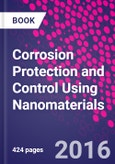The book is divided into two parts. Part one looks at the fundamentals of corrosion behaviour and the manufacture of nanocrystalline materials. Chapters discuss the impact of nanotechnology in reducing corrosion cost, and investigate the influence of various factors including thermodynamics, kinetics and grain size on the corrosion behaviour of nanocrystalline materials. There are also chapters on electrodeposition and the corrosion behaviour of electrodeposited nanocrystalline materials. Part two provides a series of case studies of applications of nanomaterials in corrosion control. Chapters review oxidation protection using nanocrystalline structures at various temperatures, sol- gel and self-healing nanocoatings and the use of nanoreservoirs and polymer nanocomposites in corrosion control.
With its distinguished editors and international team of expert contributors, Corrosion protection and control using nanomaterials is an invaluable reference tool for researchers and engineers working with nanomaterials in a variety of industries including, aerospace, automotive and chemical engineering as well as academics studying the unique protection and control offered by nanomaterials against corrosion.
- Explores the potential use of nanotechnology and nanomaterials for corrosion prevention, protection and control
- Discusses the impact of nanotechnology in reducing corrosion cost and investigates various factors on the corrosion behaviour of nanocrystalline materials
- Provides a series of case studies and applications of nanomaterials for corrosion control
Table of Contents
Part 1 Corrosion behaviour and manufacture of nanocrystalline materials: The impact of nanotechnology in reducing corrosion costCorrosion and nanomaterials: Thermodynamic and kinetic factors
Understanding the corrosion resistance of nanocrystalline materials: The influence of grain size
Understanding the corrosion resistance of nanocrystalline materials: Electrochemical influences
Electrodeposition: The versatile technique for nanomaterials. Part 2 The use of nanomaterials in corrosion control: Moderate temperature oxidation protection using nanocrystalline structures
High temperature oxidation protection using nanocrystalline coatings
Nanocoatings to improve the tribocorrosion performance of materials
Self-healing nanocoatings for corrosion control
The use of nanoreservoirs in corrosion protection coatings
Nanoparticle-based corrosion inhibitors and self-assembled monolayers
Sol-gel nanocoatings for corrosion protection
Polymer nanocomposites in corrosion control
Nanocoatings for corrosion protection of aerospace alloys
Nanoscience and biomaterial corrosion control.
Authors
Saji, V SDr Viswanathan S. Saji works in the Department of Advanced Materials Chemistry in Korea University, South Korea.
Cook, R. M.
Dr. Ronald Cook works at TDA Research, Inc, USA.








